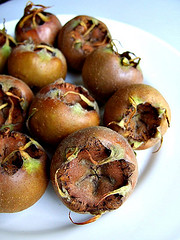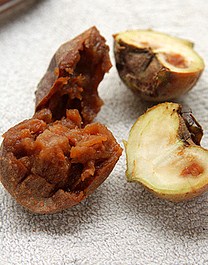This is not meant to be an answer. I just became so immersed in the topic, I wanted to learn more about the Anglo-Saxon name openærs, and its demise.
Old English ‘openærs’
Arse wasn't an impolite word when it first arrived in English. It simply meant an animal's rump, and we see it recorded in writing, from around the year 1000, in all kinds of straight-faced settings, such as glossaries, poems and scholarly works.
The Story of English in 100 words By David Crystal
As Amphiteóth correctly pointed out, the term arse ‘was not always impolite’, so a fruit called openærs was quite appropriate ‘in the context of farming/hunting’.
The French ‘medler’
Old English is dated between mid-5th century and late 11th century, the language (like any modern-day language) was not a static inflexible one. Instead it evolved, and went through a series of changes until its Anglo-Saxon identity was no longer recognizable, this transformation led experts to name its successor Middle English.
The Norman conquest in 1066 was responsible for many of the significant changes that English endured in the following 300 years. French and Latin replaced the Island's native tongue and became ‘de facto’ the official languages of authority, faith, science, law and the arts. English found itself being the third language in its own home.
It's been estimated as many as ten thousand French words were imposed on Old English. Although they did not all come at once, the relentless ‘onslaught’ of foreign words lasted until the 14th century, that is until Middle English began reappropriating its language.
Thus Norman came into use as a language of polite discourse and literature, and this fundamentally altered the role of Old English in education and administration
Because language is first of all spoken, and only recorded later, the OED's first reference of ears-lyre (arse-muscle) around the year 1000, does not mean the English weren't using the terms ers and ærs earlier. As Josh61's citation appears to confirm
This singular name [openærs] resisted for centuries also after the introduction
of the French name in the 14th century.
The same can also be said for the French term medler as @pisces mentioned: The Oxford Dictionary says that the word medlar appeared in England with Middle English, the word, of course, might have been in circulation before then.
Therefore it seems reasonable to assume that Englishmen and women did call the rude-looking fruit, openærs, for centuries and continued doing so after the Normans had invaded and renamed words that dealt with food, eating, and cooking. For example:
in ‘salmon’ (from saumoun), in ‘mackerel (from mackerel) ‘oyster’ (from oistress), sole from sole; or in meat, ‘pork’ from (porc), ‘sausages’ (from saussiches), ‘bacon’ (from bacon); or in ‘fruit’ (from fruit), ‘oranges’ (orenges), and ‘lemons’ (limons), and even ‘grapes’ (grappes) … Fry from frire, ‘vinegar’ (from vyn egre), ‘herb’ (from herbe), ‘olive’ (olive), ‘mustard’ (from moustard) and, key to it all, ‘appetite’ from (apetit).
The French arrived, took the Anglo-Saxon name ‘openærs’; chewed it, ate it, and spat it out, replacing it with their French names: medler, and mespile. By the 17th century the words ars and arse were associated with people's bottoms, so polite euphemisms such as ‘bum’; ‘buttocks’; ‘backside’; ‘behind’ and ‘posterior’ were spawned. All of which eventually led the archaic term openærs to becoming obsolete.
Bletting vs. Rotting
The clearest and least ambiguous description of bletting I found is at an online shop selling a wide selection of gourmet foods.
So what exactly is bletting? Ripe fruits are harvested in late October and spread on straw or sawdust somewhere cool for several weeks. Once they are in the first stages of decay, they are ready: the sugar content of the fruit has increased and the acids and tannins that make it sour have reduced.
Ideally, the medlars are pulled from the tree just after the first hard frost of the winter. This kicks off the bletting process.
Sources:
Merriam-Webster
Origin of open-arse (dialectal, British)
Middle English openers, from Old English openærs, from open + ærs, ears ass; from the large open disk between the lobes of the calyx
The Historical Thesaurus of English
openærs OE
medlar c1366–1858
mespile 1398–1545
medle a1400–1573
azarole 1658–
Thesaurus of Old English
Medlar : openærs (g)
Medlar : æ_pening (o)
A medlar tree : mispeler (q)
An entity that opens : openere (o)
Exposure, revealing, revelation : opennes
Anus : ears
Anus : earsgang
Anus : earsþerl (og)
The home page explains what the ‘flags’ mean
o– indicating that a word form is very infrequent
p– indicating words that seem to occur only in poetry
g– indicating words that usually appear in glossed texts or glossaries
q– indicates a doubtful form but is not searchable.
Wikipedia, Middle English; The Adventures of English By Melvyn Bragg (2003)


